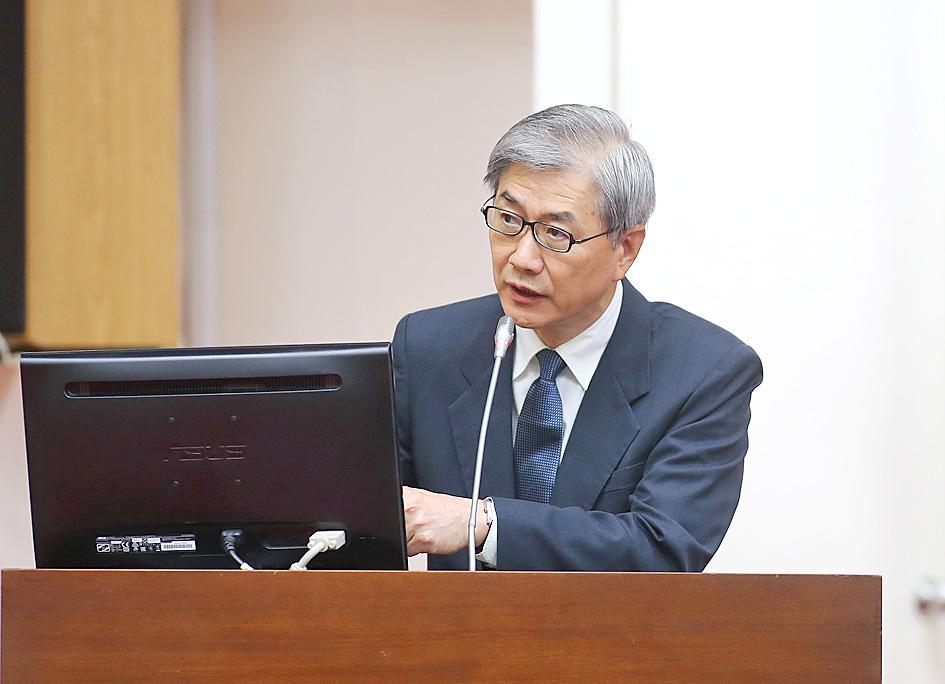The Financial Supervisory Commission (FSC) would inspect 25 companies to see if they have contravened regulations while selling products to senior citizens, commission Chairman Thomas Huang (黃天牧) said yesterday.
The commission selected 10 banks, six credit unions, six insurance companies and three securities companies for examination following a preliminary assessment, Huang told a meeting of the legislature’s Finance Committee in Taipei.
The commission would look into whether the companies have sold large amounts of high-risk financial products, such as high-yield bonds with low ratings or stocks-linked funds, to people over 65, Financial Examination Bureau Deputy Director-General Chang Tzy-hao (張子浩) said.

Photo: CNA
It would inspect whether the firms have promoted their products inappropriately, such as by encouraging clients to cancel fixed deposits in advance or to borrow money to buy the financial products, Chang said.
The commission would examine whether the companies have provided comprehensive information to clients about investment risks and the products’ content, he said.
The regulator would also check whether the firms have set anti-fraud mechanisms to confirm that their staff perform well and their clients are fully aware of investment risks, Chang said.
As senior citizens generally do not have a high risk appetite, companies should be more careful when selling risky products to them, he said.
“We are not saying that seniors must not buy risky products, but we want to ensure that financial companies understand their clients’ risk appetite and financial strength before selling products,” Huang said.
The fines for inappropriately selling financial products to senior citizens would be heavier than those imposed for selling such products to regular clients, he said.
Banks could be fined up to NT$50 million (US$1.8 million) if found to have contravened the regulations, while insurers could be fined NT$12 million, securities companies NT$4.8 million and credit unions could be fined NT$600,000, the commission said.
It has demanded that insurers record their marketing activities from beginning to end when selling investment-linked products to senior citizens.
The inspections are to begin later this month and end at the end of July, Chang said.

South Korea’s equity benchmark yesterday crossed a new milestone just a month after surpassing the once-unthinkable 5,000 mark as surging global memory demand powers the country’s biggest chipmakers. The KOSPI advanced as much as 2.6 percent to a record 6,123, with Samsung Electronics Co and SK Hynix Inc each gaining more than 2 percent. With the benchmark now up 45 percent this year, South Korea’s stock market capitalization has also moved past France’s, following last month’s overtaking of Germany’s. Long overlooked by foreign funds, despite being undervalued, South Korean stocks have now emerged as clear winners in the global market. The so-called “artificial intelligence

Chinese artificial intelligence (AI) start-up DeepSeek’s (深度求索) latest AI model, set to be released as soon as next week, was trained on Nvidia Corp’s most advanced AI chip, the Blackwell, a senior official of US President Donald Trump’s administration said on Monday, in what could represent a violation of US export controls. The US believes DeepSeek will remove the technical indicators that might reveal its use of American AI chips, the official said, adding that the Blackwells are likely clustered at its data center in Inner Mongolia, an autonomous region of China. The person declined to say how the US government received

‘SEISMIC SHIFT’: The researcher forecast there would be about 1.1 billion mobile shipments this year, down from 1.26 billion the prior year and erasing years of gains The global smartphone market is expected to contract 12.9 percent this year due to the unprecedented memorychip shortage, marking “a crisis like no other,” researcher International Data Corp (IDC) said. The new forecast, a dramatic revision down from earlier estimates, gives the latest accounting of the ongoing memory crunch that is affecting every corner of the electronics industry. The demand for advanced memory to power artificial intelligence (AI) tasks has drained global supply until well into next year and jeopardizes the business model of many smartphone makers. IDC forecast about 1.1 billion mobile shipments this year, down from 1.26 billion the prior

FORTUNES REVERSED: The new 15 percent levies left countries with a 10 percent tariff worse off and stripped away the advantage of those with a 15 percent rate In a swift reversal of fortunes, countries that had been hardest hit by US President Donald Trump’s tariffs have emerged as the biggest winners from the US Supreme Court’s decision to strike down his emergency levies. China, India and Brazil are among those now seeing lower tariff rates for shipments to the US after the court ruled Trump’s use of the International Emergency Economic Powers Act to impose duties was illegal. While Trump subsequently announced plans for a 15 percent global rate, Bloomberg Economics said that would mean an average effective tariff rate of about 12 percent — the lowest since